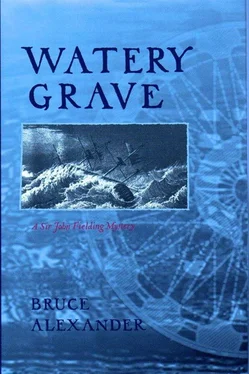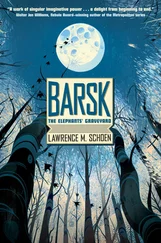Bruce Alexander - Watery Grave
Здесь есть возможность читать онлайн «Bruce Alexander - Watery Grave» весь текст электронной книги совершенно бесплатно (целиком полную версию без сокращений). В некоторых случаях можно слушать аудио, скачать через торрент в формате fb2 и присутствует краткое содержание. Год выпуска: 1996, ISBN: 1996, Издательство: Putnam, Жанр: Исторический детектив, на английском языке. Описание произведения, (предисловие) а так же отзывы посетителей доступны на портале библиотеки ЛибКат.
- Название:Watery Grave
- Автор:
- Издательство:Putnam
- Жанр:
- Год:1996
- ISBN:9780399141553
- Рейтинг книги:3 / 5. Голосов: 1
-
Избранное:Добавить в избранное
- Отзывы:
-
Ваша оценка:
- 60
- 1
- 2
- 3
- 4
- 5
Watery Grave: краткое содержание, описание и аннотация
Предлагаем к чтению аннотацию, описание, краткое содержание или предисловие (зависит от того, что написал сам автор книги «Watery Grave»). Если вы не нашли необходимую информацию о книге — напишите в комментариях, мы постараемся отыскать её.
Watery Grave — читать онлайн бесплатно полную книгу (весь текст) целиком
Ниже представлен текст книги, разбитый по страницам. Система сохранения места последней прочитанной страницы, позволяет с удобством читать онлайн бесплатно книгу «Watery Grave», без необходимости каждый раз заново искать на чём Вы остановились. Поставьте закладку, и сможете в любой момент перейти на страницу, на которой закончили чтение.
Интервал:
Закладка:
“Well, Sir John, I gave chase, though there was no sound of steps to follow. There was two ways to take, and I must’ve took the wrong one, for I lost the trail.”
“I see. And where would the other way have taken you?”
“Toward the river and the Tower.”
“Well and good, Mr. Perkins: I believe I shall have Mr. Proctor take up the story at this point.”
Just as I was making to stand up, Mr. Bilbo grasped my arm and whispered in my ear, “I believe we’re off the hook, lad. My thanks to Mr. Perkins.”
I returned his wink as Mr. Marsden called out my name.
“Now, tell me, Mr. Proctor,” said Sir John to me, rather severely, “after you rampaged through that lodging house threatening its residents with an empty pistol, what did you find when at last you entered the room at the end of the hall?”
Thus I told him what I have already told you, reader, and no need to repeat it now. My testimony was brief, and Sir John did not ask me to enlarge on any part of it. I described the condition of the body of Tobias Trindle. I described the condition of the room. He ended my part of the tale at the appearance of Black Emma.
“Call her, Mr. Marsden,” said Sir John.
“Emma Black, come forward now.”
She rose but remained reluctantly where she stood.
“That ain’t my name,” said she most firmly.
He looked down at the paper in his hand and back up at her.
“It is not your name?” said he.” Well, what is?”
“Black Emma,” said she.” It’s the only one I ever had.”
He frowned at that, leaned over, and entered into a whispered discussion with Sir John. Then, with a nod to him, he returned to her.
“Would you care to choose a surname now? ” asked the clerk.
“You mean a name like Smith, or Jones, or Tatersby? ‘
“That’s right.”
“Well, I ain’t sure.” She thought upon it for a moment.” Say my name like you said it before.”
“Emma Black! ” Though he did not shout it, he let it ring out a bit.
“I like that well enough. Leave it so.”
“Then come forward, please.”
That she did, and if Hartsell had previously held some hope that the weight of testimony against him was not so great (for neither Mr. Perkins nor I had claimed to see the face of the man who had fled), then it was dashed utterly by the recital of Emma Black. From her perch on the chamber pot, she had seen a man enter the room, pistol in hand. He stepped over to the bed where Tobias Trindle slept and, putting the barrel of the pistol close to his forehead, pulled the trigger. She heard the loud report of the shot. She saw Trindle s body jump convulsively and sprawl across the bed. She saw his murderer then turn toward her hiding place and pull out another pistol. But, hearing the approach of another, he turned away and ran swiftly out the door.
“How was the man dressed?” Sir John asked her.
“It were not easy to tell, sir, ” said she.” He had on a black cloak that covered him, shoulder to boots. But when he pulled out that other pistol, I did see the flash of something could’ve been a brass button.”
“I see. Then there was light in the room?”
“One candle was burning, my side of the bed.”
“Could you, by the light of that single candle, see his features clearly?”
“I could, sir, for when he bent over Toby to do his nasty act, the light from the candle showed his face clear.”
“So you then saw him well enough to identify him now?”
“Oh yes, sir, indeed I can.”
“Is that man here in the room now?”
“He is, sir. He is sittin’ right there.”
And turning, Emma Black pointed directly at Captain James Hartsell.
“Thank you, Miss Black, that will be all.”
“Thank you, sir.”
With that, she curtseyed, after her fashion, and returned to her chair.
“Prisoners, come forward again,” Mr. iMarsden called out.
And forward they came, Boone quite willingly, and Hartsell somewhat reluctantly though not forced; they were accompanied by Mr. Bailey and Mr. Perkins. Sir John was most solemn in mien and demeanor as he waited upon them and then addressed them once again.
“Captain Hartsell and Midshipman Boone,” said he, “as you have heard, there is more than sufficient testimony to bind you over for trial in felony court. Have you now ani: hing to say? Mr. Boone?”
“Just what I said before. I only done what he told me.”
Hartsell turned and gave Boone a withering, contemptuous look. Yet Boone was not withered; he returned a defiant look of his own.
Sir John, who was quite naturally oblivious of this unspoken exchange, simply inclined his head in the direction of Captain Hartsell and asked if he now had anything to say.
“I have nothing to say,” responded the captain, “for the reason that I do not recognize you or the authorit3. of your court over me.”
“We have already discussed that. You are obviously not averse to repeating yourself. I, however, am. The governor and warders of New-gate jail will now have authorit)’ over you until the time of your trial — and, no doubt, for a short time afterward. You may argue your position with them, if you like. Do not expect them to be sympathetic to it.
“Midshipman Boone, since you seem to feel yourself a victim of the captain and apparently w4sh to end your association with him, I shall help you make a first step in that direction by sending you to the Fleet Prison, rather than Newgate. It is principally a prison for debtors, and they may treat a lad of your years more gently than would the hardened criminals who make up the better part of Newgate’s population.”
“Oh, thank you, sir, thank you,” wailed Boone.
“Don’t mention it,” said Sir John, in an expression of generosity somewhat tinged with irony.” Now, Mr. Bailey and Mr. Perkins, you will accompany Captain Hartsell to Newgate forthwith. Mr. Cowley and Mr. Proctor will see Midshipman Boone to the Fleet and return Isaac Tenker there, as well — but not until a bit later, for I have matters to discuss further with the midshipman. The rest of you may now go with my thanks. Mr. Marsden will provide you with a shilling each for your return to your lodgings in a hackney carriage. Yet please remember that you will be called upon to testify when the date of the trial is set at Old Bailey.”
By the time Sir John Fielding had done with Midshipman Albert Boone he not only had from him an agreement to testify against his captain, which he gladly gave in exchange for Sir John’s promise to recommend transportation for him, rather than hanging; he had also secured his signature on two copies of a document written out by Mr. Marsden in which he freely admitted that he had given perjured testimony in the trial by court-martial of Lieutenant William Landon.
The trip to the Fleet Prison in Mr. Bilbo’s coach-and-four was quite uneventful, save for Constable Cowley’s frequent yawns, which put me in fear that he might doze off and the two prisoners might take it in mind to scarper; since he was armed and I was not, there was little I could have done to prevent them. Yet Mr. Cowley, in spite of the fact that he had spent the night patrolling the streets of Westminster, managed to keep awake the length of the drive. And in truth, neither Old Isaac nor Boone showed any inclination toward bold action. The seaman grumbled sullenly on and on that he would now be held as a material witness after his chums had been let go; while the midshipman said ne’er a word, so plunged into gloom was he by the contemplation of his future.
The transfer of the prisoners to the warders at the gate of the Fleet was managed without incident. As instructed, I told them that Sir John had specified that Boone be kept separate from the other prisoners from the H.M.S. Ac)ventiire; and I was assured that his wish would be respected. There was left naught for Mr. Cowley and me then but to be returned in great style to Number 4 Bow Street. He had to be shaken there from a deep slumber, for he had given in to sleep the moment he had reentered the coach and settled again upon its soft cushions. But upon our arrival he came awake and staggered down. We called our thanks to the driver and footman. Constable Cowley parted from me there to labor back on wobbly legs to his lodgings nearby.
Читать дальшеИнтервал:
Закладка:
Похожие книги на «Watery Grave»
Представляем Вашему вниманию похожие книги на «Watery Grave» списком для выбора. Мы отобрали схожую по названию и смыслу литературу в надежде предоставить читателям больше вариантов отыскать новые, интересные, ещё непрочитанные произведения.
Обсуждение, отзывы о книге «Watery Grave» и просто собственные мнения читателей. Оставьте ваши комментарии, напишите, что Вы думаете о произведении, его смысле или главных героях. Укажите что конкретно понравилось, а что нет, и почему Вы так считаете.












